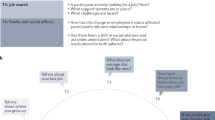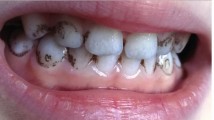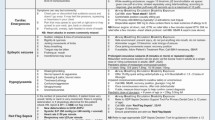Abstract
Background This study compared the effectiveness of motivational interviewing (MI) and conventional caries prevention (CCP) for primary (caries increment) and secondary outcomes (caries intensity, gingival health, caregiver-reported oral health-related knowledge, behaviours and attitudes) over 12 months.
Methods High-caries-risk children and caregivers received CCP or MI with comprehensive dental care. Fidelity was monitored using MI treatment integrity code 4.2.1. Caries increment, intensity and gingival health were measured at baseline, six and twelve months. Readiness Assessment of Parents Concerning Infant Dental Decay questionnaires recorded oral health-related knowledge, behaviours and attitudes.
Results In total, 86 caregiver-child dyads (CCP = 51; MI = 35) were recruited. The mean difference (95% confidence interval [CI]) in caries increment (ΔdICDAS1-6mfs + DICDAS1-6MFS) was significantly higher with MI compared to CCP at six (MI 2.3 [1.2, 3.5] vs CCP 0.6 [0.1, 1.0]; p <0.001) and twelve (MI 4.3 [2.5, 6.0] vs CCP 1.2 [0.6, 1.8]; p <0.001) months. Multivariate analysis with CCP as reference group, odds ratio (95% CI) for new/progressed caries (Δdecayed, missing and filled surface score [permanent] + decayed, missing and filled surface score [primary] >0) at six and twelve months were 18.2 (4.0, 81.7); p <0.001 and 12.6 (3.3, 47.8); p <0.001, respectively. The MI group reported positive behaviours and attitudes.
Conclusions CCP was more effective in reducing caries increment when behaviour change technique was incorporated into the preventative strategies as per current paediatric dentistry guidelines.
Key points
-
CCP was more effective than MI for prevention of caries development and progression.
-
Preventive strategies with behaviour change techniques incorporated were effective in reducing caries.
-
Clinicians are recommended to use combination behavioural methods for high-caries-risk children.
This is a preview of subscription content, access via your institution
Access options
Subscribe to this journal
Receive 24 print issues and online access
$259.00 per year
only $10.79 per issue
Buy this article
- Purchase on Springer Link
- Instant access to full article PDF
Prices may be subject to local taxes which are calculated during checkout

Similar content being viewed by others
References
Petersen P E, Bourgeois D, Ogawa H, Estupinan-Day S, Ndiaye C. The global burden of oral diseases and risks to oral health. Bull World Health Organ 2005; 83: 661-669.
Campbell C, Soldani F, Busuttil-Naudi A, Chadwick B. Clinical Guidelines in Paediatric Dentistry: Update of non-pharmacological behaviour management guideline. 2011. Available at https://www.bspd.co.uk/Portals/0/Public/Files/Guidelines/Non-pharmacological%20behaviour%20management%20.pdf (accessed May 2020).
Scottish Intercollegiate Guidelines Network. Dental interventions to prevent caries in children. 2014. Available at https://www.scottishdental.org/wp-content/uploads/2014/04/SIGN138.pdf (accessed May 2021).
Scottish Dental Clinical Effectiveness Programme. Prevention and Management of Dental Caries in Children. 2018. Available at https://www.sdcep.org.uk/media/2zbkrdkg/sdcep-prevention-and-management-of-dental-caries-in-children-2nd-edition.pdf (accessed August 2020).
Public Health England. Delivering better oral health: an evidence-based toolkit for prevention. 2021. Available at https://www.gov.uk/government/publications/delivering-better-oral-health-an-evidence-based-toolkit-for-prevention (accessed May 2022).
McGrath C. Behavioral Sciences in the Promotion of Oral Health. J Dent Res 2019; 98: 1418-1424.
Miller W R. Motivational interviewing: helping people change. 3rd ed. New York: Guilford Press, 2013.
Gayes L A, Steele R G. A meta-analysis of motivational interviewing interventions for pediatric health behavior change. J Consult Clin Psychol 2014; 82: 521-535.
Weinstein P, Harrison R, Benton T. Motivating mothers to prevent caries: confirming the beneficial effect of counseling. J Am Dent Assoc 2006; 137: 789-793.
Pine C M, Adair P M, Burnside G et al. Dental RECUR Randomized Trial to Prevent Caries Recurrence in Children. J Dent Res 2020; 99: 168-174.
Jamieson L, Smithers L, Hedges J et al. Dental Disease Outcomes Following A 2-Year Oral Health Promotion Program for Australian Aboriginal Children and Their Families: A 2-Arm Parallel, Single-blind, Randomised Controlled Trial. EClinicalMedicine 2018; 1: 43-50.
Batliner T S, Tiwari T, Henderson W G et al. Randomized Trial of Motivational Interviewing to Prevent Early Childhood Caries in American Indian Children. JDR Clin Trans Res 2018; 3: 366-375.
Ismail A I, Ondersma S, Jedele J M W, Little R J, Lepkowski J M. Evaluation of a brief tailored motivational intervention to prevent early childhood caries. Community Dent Oral Epidemiol 2011; 39: 433-448.
Faghihian R, Faghihian E, Kazemi A, Tarrahi M J, Zakizade M. Impact of motivational interviewing on early childhood caries: A systematic review and meta-analysis. J Am Dent Assoc 2020; 151: 650-659.
Colvara B C, Faustino-Silva D D, Meyer E, Hugo F N, Celeste R K, Hilgert J B. Motivational interviewing for preventing early childhood caries: A systematic review and meta-analysis. Community Dent Oral Epidemiol 2021; 49: 10-16.
Featherstone J D B, Chaffee B W. The evidence for Caries Management By Risk Assessment (CAMBRA). Adv Dent Res 2018; 29: 9-14.
Dhand N K, Khatkar M S. Statulator: an online statistical calculator. Sample size calculator for comparing two independent means. 2014. Available at http://statulator.com/SampleSize/ss2M.html (accessed February 2018).
Wu L, Gao X, Lo E C M, Ho S M Y, McGrath C, Wong M C M. Motivational Interviewing to Promote Oral Health in Adolescents. J Adolesc Health 2017; 61: 378-384.
International Caries Classification and Management System. ICDAS Calibration for ICCMS(TM). 2018. Available at https://www.iccms-web.com/content/resources/elearning (accessed March 2018).
Christian B, Amezdroz E, Calache H, Gussy M, Sore R, Waters E. Examiner calibration in caries detection for populations and settings where in vivo calibration is not practical. Community Dent Health 2017; 34: 248-253.
Pitts N, Ekstrand K, ICDAS Foundation. International Caries Detection and Assessment System (ICDAS) and its International Caries Classification and Management System (ICCMS) - methods for staging of the caries process and enabling dentists to manage caries. Community Dent Oral Epidemiol 2013; DOI: 10.1111/cdoe.12025.
Moyers T B, Rowell L N, Manuel J K, Ernst D, Houck J M. The Motivational Interviewing Treatment Integrity code (MITI 4): Rationale, Preliminary Reliability and Validity. J Subst Abuse Treat 2016; 65: 36-42.
Espelid I, Mejàre I, Weerheijm K, EAPD. EAPD guidelines for use of radiographs in children. Eur J Paediatr Dent 2003; 4: 40-48.
Braga M M, Oliveira L B, Bonini G A V C, Bönecker M, Mendes F M. Feasibility of the International Caries Detection and Assessment System (ICDAS-II) in epidemiological surveys and comparability with standard World Health Organization criteria. Caries Res 2009; 43: 245-249.
British Society of Periodontology. Guidelines for periodontal screening and management of children and adolescents under 18 years of age: Guidelines produced in conjunction with the British Society of Periodontology and British Society of Paediatric Dentistry. 2012. Available at https://www.bsperio.org.uk/assets/downloads/bsp_bspd-perio-guidelines-for-the-under-18s-2012.pdf (accessed 25 August 2020).
Weinstein P, Riedy C A. The reliability and validity of the RAPIDD scale: readiness assessment of parents concerning infant dental decay. ASDC J Dent Child 2001; 68: 129-135.
Zima A. The effects of motivational interviewing in pregnancy on knowledge and retention of infant oral health information. Virginia: Virginia Commonwealth University, 2010. Master's Thesis.
George A, Johnson M, Blinkhorn A et al. The oral health status, practices and knowledge of pregnant women in south-western Sydney. Aust Dent J 2013; 58: 26-33.
Van den Branden S, Van den Broucke S, Leroy R, Declerck D, Hoppenbrouwers K. Predicting oral health-related behaviour in the parents of preschool children: An application of the Theory of Planned Behaviour. Health Educ J 2014; 74: 221-230.
Leske A M, Mustchin C, Bhujel N, Rajan S, Satur J. Fidelity of motivational interviewing with families in high-caries-risk children. Community Dent Oral Epidemiol 2021; 49: 410-419.
Jiang S, McGrath C, Lo E C, Ho S M, Gao X. Motivational interviewing to prevent early childhood caries: A randomized controlled trial. J Dent 2020; DOI: 10.1016/j.jdent.2020.103349.
Kapoor V, Gupta A, Arya V. Behavioral changes after motivational interviewing versus traditional dental health education in parents of children with high caries risk: Results of a 1-year study. J Indian Soc Pedod Prev Dent 2019; 37: 192-197.
Colvara B C, Faustino-Silva D D, Meyer E, Hugo F N, Hilgret J B, Celeste R K. Motivational interviewing in preventing early childhood caries in primary healthcare: a community-based randomized cluster trial. J Pediatr 2018; 201: 190-195.
Saengtipbovorn S. Efficacy of Motivational Interviewing in Conjunction with Caries Risk Assessment (MICRA) Programmes in Improving the Dental Health Status of Preschool Children: A Randomised Controlled Trial. Oral Health Prev Dent 2017; 15: 123-129.
Gonzalez-Del-Castillo-McGrath M, Guizar-Mendoza J-M, Madrigal-Orozco C, Anguiano-Flores L, Amador-Licona N. A parent motivational interviewing program for dental care in children of a rural population. J Clin Exp Dent 2014; DOI: 10.4317/jced.51662.
Weinstein P, Harrison R, Benton T. Motivating parents to prevent caries in their young children: one-year findings. J Am Dent Assoc 2004; 135: 731-738.
Henshaw M M, Borrelli B, Gregorich S E et al. Randomized Trial of Motivational Interviewing to Prevent Early Childhood Caries in Public Housing. JDR Clin Trans Res 2018; 3: 353-365.
Manchanda K, Sampath N, Sarkar A D. Evaluating the effectiveness of oral health education program among mothers with 6-18 months children in prevention of early childhood caries. Contemp Clin Dent 2014; 5: 478-483.
Mohammadi T M, Hajizamani A, Bozorgmehr E. Improving oral health status of preschool children using motivational interviewing method. Dent Res J (Isfahan) 2015; 12: 476-481.
International Caries Classification and Management System. ICCMS™ Guide for Practitioners and Educators. 2014. Available at https://www.iccms-web.com/uploads/asset/59284654c0a6f822230100.pdf (accessed June 2020).
Michie S, Richardson M, Johnston M et al. The behavior change technique taxonomy (v1) of 93 hierarchically clustered techniques: building an international consensus for the reporting of behavior change interventions. Ann Behav Med 2013; 46: 81-95.
Rigau-Gay M-M, Claver-Garrido E, Benet M, Lusilla-Palacios P, Ustrell-Torrent J-M. Effectiveness of motivational interviewing to improve oral hygiene in orthodontic patients: A randomized controlled trial. J Health Psychol 2020; 25: 2362-2373.
Lalic M, Aleksic E, Gajic M, Milic J, Malesevic D. Does oral health counseling effectively improve oral hygiene of orthodontic patients? Eur J Paediatr Dent 2012; 13: 181-186.
Freudenthal J J, Bowen D M. Motivational interviewing to decrease parental risk-related behaviors for early childhood caries. J Dent Hyg 2010; 84: 29-34.
Naidu R, Nunn J, Irwin J D. The effect of motivational interviewing on oral healthcare knowledge, attitudes and behaviour of parents and caregivers of preschool children: an exploratory cluster randomised controlled study. BMC Oral Health 2015; 15: 101.
Zhao X, Gao X, Lo E C-M, McGrath C, Ho S M-Y. Effectiveness of motivational interviewing: face-to-face individual counseling vs online group. J Dent Res 2018.
Cascaes A M, Bielemann R M, Clark V L, Barros A J D. Effectiveness of motivational interviewing at improving oral health: a systematic review. Rev Saude Publica 2014; 48: 142-153.
Wagner Y, Greiner S, Heinrich-Weltzien R. Evaluation of an oral health promotion program at the time of birth on dental caries in 5-year-old children in Vorarlberg, Austria. Community Dent Oral Epidemiol 2014; 42: 160-169.
Weinstein P, Milgrom P, Riedy C A et al. Treatment fidelity of brief motivational interviewing and health education in a randomized clinical trial to promote dental attendance of low-income mothers and children: Community-Based Intergenerational Oral Health Study "Baby Smiles". BMC Oral Health 2014; DOI: 10.1186/1472-6831-14-15.
Harrison R L, Veronneau J, Leroux B. Effectiveness of maternal counseling in reducing caries in Cree children. J Dent Res 2012; 91: 1032-1037.
Acknowledgements
The authors wish to acknowledge the contributions of Victoria Perchyonok and Luisa Lorenzo to the delivery of MI.
Author information
Authors and Affiliations
Contributions
Amanda M. Leske, Sadna Rajan and Nabina Bhujel designed and developed the idea. Amanda L. Leske, Claire Mustchin, Julie Satur, Nabina Bhujel and Sadna Rajan finalised the research protocol. Amanda M. Leske collected data. Amanda M. Leske and Sandy Clarke-Errey analysed data. Amanda M. Leske prepared the first draft. Amanda M. Leske, Sadna Rajan, Nabina Bhujel and Sandy Clarke-Errey revised and edited subsequent drafts. Amanda M. Leske, Sandy Clarke-Errey, Claire Mustchin, Julie Satur, Nabina Bhujel and Sadna Rajan approved the final draft.
Corresponding author
Ethics declarations
All authors have no conflicts of interest to declare.
Rights and permissions
About this article
Cite this article
Leske, A., Mustchin, C., Clarke-Errey, S. et al. Motivational interviewing versus conventional caries prevention strategies in high-caries-risk children and families: a non-randomised trial. Br Dent J (2022). https://doi.org/10.1038/s41415-022-4341-4
Received:
Accepted:
Published:
DOI: https://doi.org/10.1038/s41415-022-4341-4



